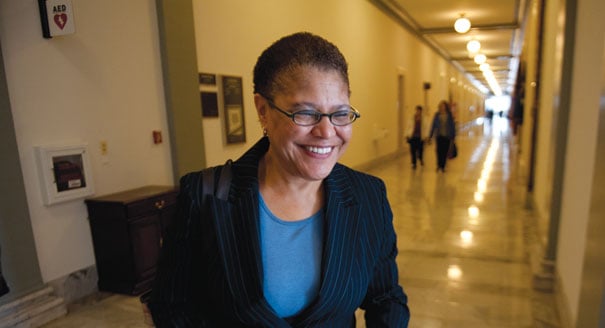
Today, Congressmember Karen Bass (CA-37) joined Congresswoman Linda T. Sánchez (CA-38) and U.S. Senator Bob Menendez (D-NJ) in introducing the bicameral U.S. Citizenship Act of 2021, President Biden’s bold, inclusive, and humane framework for the future of the United States immigration system. Reps. Zoe Lofgren (CA-19), Lucille Roybal-Allard (CA-40), Nydia Velázquez (NY-07), Judy Chu (CA-27), Yvette Clarke (NY-09), Karen Bass (CA-37), and Raul Ruiz (CA-36), and Sens. Alex Padilla (D-CA), Ben Ray Luján (D-NM), Cory Booker (D-NJ), Mazie Hirono (D-HI) and Amy Klobuchar (D-MN) joined as chief cosponsors.
The legislation would provide millions of hardworking, undocumented immigrants with a pathway to earned citizenship, including Dreamers, Temporary Protective Status (TPS) recipients, and essential workers who have made enormous sacrifices during the pandemic; prioritize family reunification and keeping families together; and bolster the country’s long-term economic growth. The bill would also equip the country to responsibly and effectively manage the border with smart and effective investments, address root causes of migration that force people to leave Central America, and restore the United States’ commitment to human rights.
“Today, I’m proud to join my colleagues in taking decisive and robust action to reform our immigration system,” said Rep. Karen Bass (CA-37). “Over the last four years we all witnessed horrific immigration policies resulting in thousands of children being removed from their parents, families held in cages, and refugees from as far away as Cameroon and countries in Western Africa forced to languish in Mexico because the US consistently violated international asylum laws. It is my hope that my colleagues will join in voting to pass this important piece of legislation – reforming our immigration system.”
The U.S. Citizenship Act of 2021 establishes a moral and economic imperative and a vision of immigration reform that is expansive and inclusive:
- Creates an earned roadmap to citizenship for all 11 million undocumented immigrants, providing Dreamers, TPS holders, and some farmworkers with an expedited three-year path to citizenship, and giving all other undocumented immigrants who pass background checks and pay taxes with an eight-year path to citizenship without fear of deportation.
- Reforms family-based immigration system to keep families together by recapturing visas from previous years to clear backlogs, including spouses and children of green card holders as immediate family members, and increasing per-country caps for family-based immigration. It also eliminates discrimination facing LGBTQ+ families, provides protections for orphans, widows and children, allows immigrants with approved family-sponsorship petitions to join family in the U.S. on a temporary basis while they wait for green cards to become available.
- Grows our economy by making changes to the employment-based immigration system, eliminating per-country caps, making it easier for STEM advanced degree holders from U.S. universities to stay, improving access to green cards for workers in lower-wage industries, and giving dependents of H-1B holders work authorization, and preventing children of H-1B holders from aging out of the system. The bill also creates a pilot program to stimulate regional economic development and incentivizes higher wages for non-immigrant, high-skilled visas to prevent unfair competition with American workers.
- Increases fundings for immigrant integration initiatives and supports state and local governments, NGOs, and other community organizations that conduct inclusion programs, provide English language assistance, and make available naturalization resources to immigrant communities.
- Protects workers from exploitation and improves the employment verification process by requiring the Department of Homeland Security (DHS) and the Department of Labor to establish a commission involving labor, employer, and civil rights organizations to help improve the employment verification process and granting workers who suffer serious labor violations greater access to U visa relief.
- Supports asylum seekers and other vulnerable populations by eliminating the one-year deadline for filing asylum claims, reducing asylum application backlogs, increasing protections for U visa, T visa, and VAWA applicants, including by raising the cap on U visas from 10,000 to 30,000.
The U.S. Citizenship Act of 2021 also addresses the root causes of migration and prioritizes U.S. national security:
- Addresses the root causes of migration from Central America by funding the President’s four-year plan to increase assistance to El Salvador, Guatemala, and Honduras conditioned on their ability to reduce the corruption, violence, poverty, and famine that now causes people to flee.
- Creates safe and legal channels for people to seek protection, so they can apply for legal status in Central America instead of making the dangerous journey north. The bill also re-institutes the Central American Minors program to reunite children with U.S. relatives and creates a Central American Family Reunification Parole Program to more quickly unite families with approved family sponsorship petitions.
- Improves the immigration courts and protects vulnerable individuals by expanding family case management programs, reducing immigration court backlogs, expanding training for immigration judges, and improving technology for immigration courts. It also restores fairness and balance to our immigration system by providing judges and adjudicators with discretion to review cases and grant relief to deserving individuals, and also gives funding for school districts educating unaccompanied children.
Zach Siedel


Be the first to comment